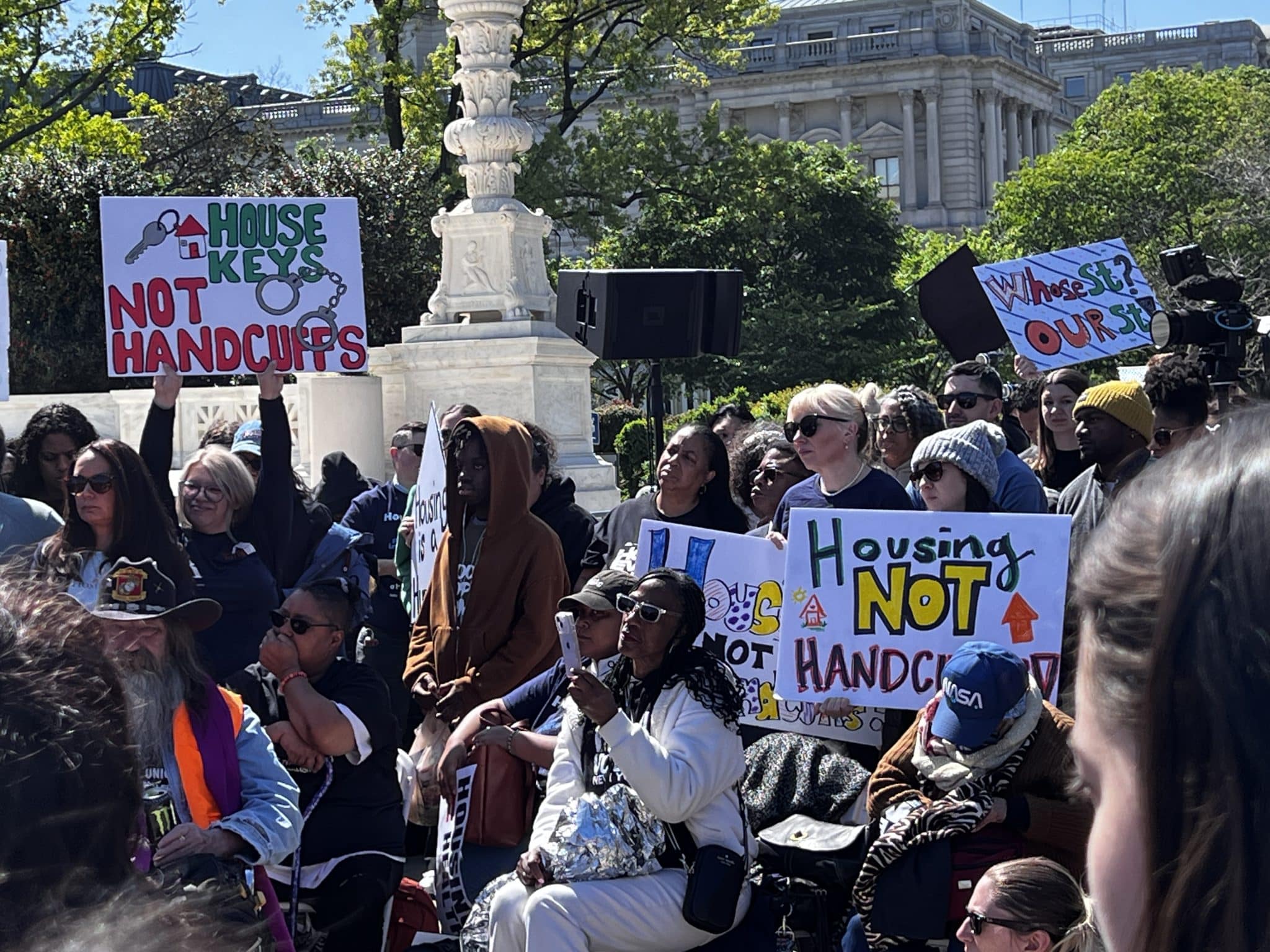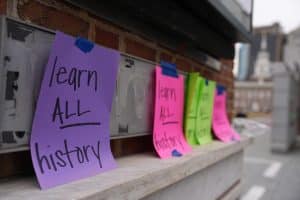“Who sits there and thinks, with all the needs we have in America, of criminalizing the homeless?” wonders Pastor Robert Brown of Bristol’s Bible Evangelical Methodist Church after learning that the United States Supreme Court approved punishing those experiencing homelessness who have nowhere to sleep.
The clergyman continued, “I’m sick of it. I don’t know where they [the justices] are coming from.”
Four Democratic Pennsylvania state senators – and a growing number of state representatives – share Brown’s outrage. Senators Nikil Saval (D–Philadelphia County), Vincent Hughes (D–Montgomery and Philadelphia Counties), Amanda Cappelletti (D–Delaware and Montgomery Counties), and Tim Kearney (D–Delaware County) hosted a press conference July 2 announcing their intention to prohibit municipalities in the keystone state from enacting laws punishing residents simply because they have nowhere to live.
Following the Supreme Court’s June 28th ruling on Grants Pass v Johnson, et al., these lawmakers sprang into action. In fact, Senator Saval explained that this was no reactionary thinking, they had prepared themselves for a negative outcome. “Given the composition of this court, we were anticipating a decision of this kind,” he said.
And though the Senators haven’t drafted a bill yet, they’re ready to get to work on behalf of their unhoused constituents. “Our press conference was an announcement of intention. We are exploring options and plan to host policy hearings.”
Murielle Kelly, Director of Housing Services at Family Service Association of Bucks County, hopes it works. Kelly knows that criminalization will just make her job harder. “They [those experiencing homelessness] already don’t trust us. They don’t believe that there will be an answer to their problem. Justifiably so. They’ve been lied to. They’ve been fooled.” She sees clearly what the Supreme Court justices seem to have missed: too many people have no alternative to living life on the street. “We don’t have enough housing. We don’t have enough places for them to live.”
Saval understands this.
“Criminalization doesn’t work, housing does,” he said. “Criminalization just leads to more homelessness. Housing is a human right; we need to protect it.”
READ: We Need Housing, Not Handcuffs for People Experiencing Homelessness
Brandi Stewart, a Street Healthcare Nurse with Family Services, agrees, cautioning that driving marginalized people further into hiding will endanger their health. “Right now, if they live in the woods, they come out for us to treat them. We have everything from pregnant clients to really serious chronic conditions.” She says that fear of citation or arrest “is gonna make it all harder for people to access healthcare.”
Back when Stewart first started providing nursing care to her Bucks County neighbors, the police would follow along behind. “When we started the cops would sweep through after us. We asked them to stop following us.” Certain that she didn’t need police protection; the presence of law enforcement made her patients feel vulnerable and her job more challenging. “I never feel fear when we go into a camp. We go as a group. Our clients are typically very happy to see us. A lot of our clients are chronically homeless.” She says that many, “are much older, have COPD, or are on dialysis.”
Stewart marvels at how difficult life is for her patients who require challenging care – like chemotherapy or dialysis – but have no home, “What if you don’t have a safe spot? You can’t handle anything else, then you’re constantly in flight. I can’t imagine living that way, every single day.”
In Grants Pass, for now, it’s not every single day. It’s every three days. The Supreme Court only eliminated one half of the injunctive relief put in place by the U.S. 9th Circuit Court of Appeals – the cruel and unusual aspect of the 8th Amendment. Because the justices didn’t entertain the constitutionality of the entire ruling, it leaves other protections in place – resulting in a three day camping ordinance, among other things.
Helen Cruz says 72 hours isn’t enough time to catch her breath. One of the Grants Pass residents who has no home, Cruz’ family moved to the town when she was only four-years-old. She’s lived there ever since. For the last few years of those four decades, Cruz has been living hopelessly homeless. “Even if I worked ten hours a day, seven days a week, I still would not be able to afford even a studio apartment.” Part of that is availability and price, but an even more difficult barrier now is her credit. “Mine has been destroyed because of all the tickets they gave me [hundreds of dollars each], which went straight to collections.”
Cruz understands what Pennsylvanians are going through and further explained additional barriers to renting, “You have to be able to prove you make three times your rent… and you have to pass criminal background checks. It’s impossible… the cops around here make you criminals [for] surviving and living outside.”
Eric Tars, Senior Policy Director at the National Homelessness Law Center, explained that for now, Grants Pass is limited to enforcing “reasonable restrictions” on those living outside. The town has determined that “moving from this park to that park” every 3 to 5 days is completely reasonable. If residents keep things outside their tent, officers can issue citations for littering. The attending police officers decide what’s litter. People face punishment.
“If they have anything police consider trash,” said Tars. “They can limit size of tents and prohibit people from staking them into the ground.”
READ: The Way We Treat Our Unhoused Neighbors Is Criminal
At times, during a dispute with an unhoused person, the police destroy or discard the person’s belongings. Personal items may disappear when a person is removed for questioning. Tars says, “Unusual punishment assumes punishment after conviction.” But destruction of a homeless camp is punishment before – or often without – any criminal charge. “The harm of arresting someone for being homeless is immediate.”
Tars cautions that these types of citations and arrests further traumatize people experiencing homelessness. Individuals and families have no recourse, no right to an attorney because fines and citations do not trigger the facility of a public defender. Only arrests with formal charges do.
Concerns for what last week’s ruling might mean for marginalized persons across the U.S., the National Homeless Law Center will continue working cases where the courts have issued injunctions on behalf of people living in public spaces. Those injunctions shielding encampments, like the ones in Montgomery County’s Pottstown, – which was granted by the U.S. District Court for the Eastern District of Pennsylvania in November of 2023 – may face reexamination in light of the Grants Pass ruling.
Acknowledging the danger posed by the erosion of protections, Tars applauds the initiative put forth by Senator Saval and his colleagues, and offers a template drafted by his organization to help states protect basic human rights for people who lack housing. “Our template was designed purely as a harm reduction piece. We understand that to end homelessness we will need resources.”
Saval, too, speaks of a multi-layer approach. Curtail criminalization at the local level and increase access to the necessities all people require. “We want to explore to what extent we can build enough low barrier supportive housing. Making sure communities have enough beds to support the population.” Adding, that in the meantime, “We need forms of inclusive public space where people have access to showers and other necessities. Assuring that people have their needs met.”
Housing Services Director Kelly concurs. She sees no end in sight unless somewhere, somehow, more homes become available. As of July 4th, in Bucks County alone, “We get about 2,000 calls a month from people at risk of homelessness – people who are in danger of losing their home. And three to four hundred more from people who are homeless.” Kelly doesn’t know where the money to house individuals and families will come from, “Not that long ago, average apartment rents were $1,000, now they’re $1,450. So please, do the math.”
What would it take to cure the problem? Kelly says, “If we could get 200 more affordable units in Bucks County it would be a great start.”
Pastor Brown – like Kelly and Stewart – meets folks experiencing homelessness where they live, and he’s dismayed. “Where have we come to in our society? “Some people just can’t get back on their feet. We have young people on the street. There’s a solution but it is going to take somebody who cares.”
Saval and his Democratic colleagues want the pastor to know that they care.
Unsure if they can get enough of the other senators to join them, Brown condemns any government attempt to criminalize the people he knows personally from his years of outreach. “In Bristol, the homeless had their own camp. We brought them food. They were really self-sufficient, which was remarkable because they had no home.” Brown sighed, “Remember, in Bristol there are no shelters. But the authorities went and busted that camp up.”
Brown challenges people to reconsider the situation:
“Ask yourself, if they are able to be self-sufficient in these camps, why can’t we just build them a place of their own to be self-sufficient in.”







